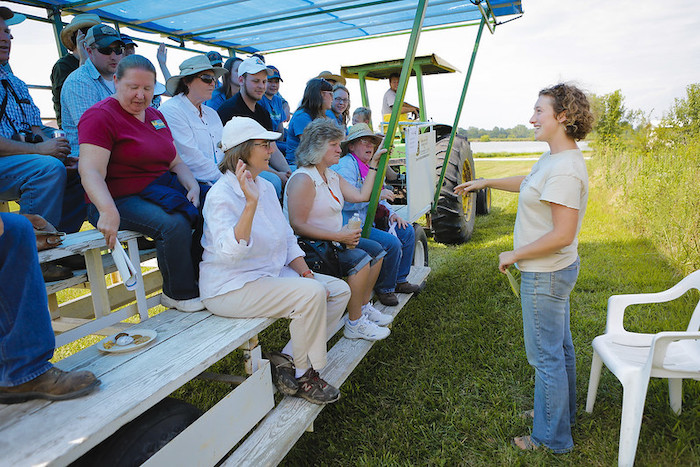This article comes to us from the Philippines and presents the activities of ICONE (Institute for Continuing Adult Education). CASEC (Community Awareness and Services for Ecological Concern), DVV International’s partner for many years, created this learning center whose educational activities mainly focus on teaching knowledge related to permaculture (permanent agriculture ), a unique method of agriculture. Egay di, coordinator of ICONE, presents the work of the Institute and its positive effects on the lives of farmers.
Teaching knowledge related to permaculture
In 1989, Community Awareness and Services for Ecological Concern Inc. (CASEC ) began implementing its grassroots non-formal adult education program in the provinces of Bohol, Bukidnon and Agusan del Sur. CASEC was able to achieve this because it understood the needs of all families in the communities it served.
The cooperation between CASEC and DVV International dates back to 1995 and has continued since then with the modest support of DVV. Let us recall that in 1977, one of the founders of CASEC had the opportunity to take part in workshops organized in the Federal Republic of Germany by the DVV for its Asian partners. The knowledge and skills acquired during its workshops gave the idea to CASEC participants to develop a concept to create a local learning center, the Institute of Continuing Adult Education (ICONE) whose educational activities are mainly focused on permaculture (permaculture, a portmanteau word taken from the expression permanent agriculture /permanent agriculture, initially designated agriculture that could be maintained indefinitely. This definition evolved to designate a philosophy generally aimed at integrating human activities in a sustainable manner within the natural space, editor’s note).
Among the many alternative systems of agriculture (e.g. organic, sustainable, eco-agriculture and biodynamic), permaculture occupies a unique place, because it operates based on a set of ethical notions involving responsible reflection and action between men and towards the planet.
ICONE has become the information center on sustainable organic agriculture and on the practices and experiences of grassroots organized groups. It is also a local adult education center, officially recognized by local administrative services.
Ethical principles of permaculture
In its ethical principles, permaculture introduces a dimension of peace into the order of things in the broad sense and indicates the path to take to earn one’s living in a correct way, that is to say with the concern of the community and the environment in the global sense rather than adopting an individualistic and indifferent attitude.
- Concern for the planet applies to all things, living and non-living: plants, animals, earth, water and air.
- Concern for people promotes community autonomy and responsibility, and access to resources, necessary for existence.
- Setting limits on population and consumption: Distribution of surpluses: provision of time, work, money and energy to achieve the objectives implied by concern for the planet and people.
The ICON educational themes formulated on this basis for courses aimed at adults and young people are as follows:
- Permaculture Design Course
- General permaculture
- Family-based community development
The characteristics of permaculture
a) Permaculture is one of the most holistic and well-integrated analytical systems and design methods in the world.
b) Permaculture can be used to create humanly productive ecosystems or to help degraded ecosystems become healthy and return to a wild state.
c) Permaculture can be applied to any ecosystem, regardless of its degree of degradation.
d) Permaculture values and recognizes traditional knowledge and experience.
e) Permaculture integrates agricultural practices and sustainable soil management techniques and strategies from around the world.
f) Permaculture builds a bridge between traditional cultures and emerging cultures in tune with the planet.
g) Permaculture promotes organic farming which does not use pesticides, sources of environmental pollution.
h) Permaculture aims to maximize the symbiotic and synergistic relationship between the elements of a site.
i) Permaculture is found as much in town planning as in land use plans in the countryside.
j) Permaculture measures are designed based on the site, client and culture.

The characteristics of the ICON
The Institute of Continuing Adult Education (ICONE)
a) is a local adult education center dedicated not only to the production system, but also to land use, and whose approach is based on a community-oriented planning philosophy;
b) identifies grassroots and indigenous approaches that can be used to implement sustainable income-generating activities and management;
c) is subject to political scrutiny from the perspective of grassroots populations to protect their rights and participate in local governance;
d) develops the skills and knowledge of grassroots populations by using a formal educational approach based on different experiences and models;
e) provides training and education activities to marginalized groups in society.
The practice
ICON is registered with the Securities and Exchange Commission and recognized by TESDA ( Training Education Service Development Authority ). Recognition by the latter strengthens the legitimacy and legal status of the ICON.
As a program of CASEC, ICON does not limit its services to a single group in society, but is open to all groups seeking improvement and development in life, livelihood and living conditions. ICONE’s training and teaching is based on the ethical principles of permaculture, because adults and young people no longer have the time to learn its teachings at university and in higher education. Conversely, communities are directly educated so as not to destroy their culture or tradition, but to base development on their needs and integrate it into their experience.
CASEC provides that ICON must help improve the conditions of the community in general and of families in particular, the family being the basic unit of society. It also provides for ICONE to take part in local governance and also aims to contribute to the creation of alliances and networks of individual educators at the grassroots so that there is a single system of adult and secondary education. young people in grassroots families.
Member organizations
CASEC has member organizations which are its partners and which at the same time participate in training and seminars organized and led by ICONE. These organizations are:
a) Candijay Federation of Rural Workers (CFRW): a federation of local voluntary organizations that implement sustainable organic agricultural activities.
b) Candijay Farmers Association (CAFAA): an organization of upland farmers dedicated to development and progress.
c) Women of Candijay for Development: an organization of women and wives of highland farmers.
(d) United Tribal Community of Agusan del Sur Region: These are organized indigenous groups of the Manobo Agusanon, Higaonon and Kamayo tribes settled in the administrative region of CARAGA, Mindanao Island in the Philippines.
e) Visayan Eskaya Tribal Community: This is the indigenous Filipino tribe of Bohol whose culture, tradition and existence are on the verge of extinction.
Apart from them, non-governmental organizations also participate in the training and seminars which take place at ICONE. These are the Bohol Community Assistance Program and its beneficiary farmer organizations as well as the Bohol NGO Alliance. Continuing adult education enables participants and partner organizations to strengthen and develop the respective groups they represent.

The courses set up
a) Sustainable Agriculture and Technology (SALT I) – This course provides upland farmers with education on farming in mountainous areas.
b) Simple Agro-Livestock Land Technology /Simple Agricultural Technique of Cultivation and Livestock Raising (SALT II) – This course is dedicated to upland agriculture incorporating livestock rearing.
c) Sustainable Agroforestry Land Technology (SALT III) – This course teaches the integrated cultivation of fruit trees and trees intended to provide timber.
d) Rice Permaculture – This course mainly looks at the natural cultivation of rice and self-production of rice seeds according to the planting seasons.
e) Gender mainstreaming – this course focuses on highland villages.
f) Participation of indigenous populations in governance.
g) Introduction to permaculture.
h) Nature and spirituality.
i) Family-based community development.
j) Small-scale livestock management.
k) Alternative modes of commerce and marketing.
l) Organizational management.
m) Training of grassroots educators – This course aims to train grassroots participants to become local facilitators.
A community-focused organization 1
- Community-based adult education allows grassroots organizations to obtain advice, develop and benefit from ongoing training in properly managing the needs of their projects. Thanks to the ethical principles of permaculture, adult education has made it possible to initiate and set up other projects necessary for community families.
- Grassroots organizations became legal entities after being officially recognized by local administrative services and were able to take part in local governance.
- The leaders of the organizations who had the opportunity to acquire skills and knowledge thanks to the training organized by ICONE have themselves become local elected officials, now able to understand political processes.
- These organizations and their leaders introduce the principles of permaculture along their path, particularly in the formulation of their community development plans.
The results
There are results at four levels, which are observed at the end of each teaching and learning activity. They are as follows:
- Course participants are able to strengthen their local organizations and set up their own projects based on what they have learned. Each participant is able to write a report of their experiences to pass it on to subsequent learners or participants.
- Organizations have improved their organizational management systems and formulated their own business plans.
- A network and contacts have been established with local administrative services, NGOs and government agencies, allowing each organization to find alternative sources of income.
- Organizations within their respective communities are able to take part in local governance through their elected members who then become local elected officials. Other members have joined the municipal council in charge of Development, responsible for collaboration with the Bohol provincial development program and the assistance provided to it.

Grassroots experience in community-oriented education 2
The lessons and experience acquired at the grassroots level through the efforts of the ICONE adult education program have foreshadowed initiatives and personal efforts undertaken to improve living conditions, which translates into progress at the level of the whole community, progress which, in turn, motivated the people, inspiring them to enshrine their visions with a view to long-term and permanent progress and development, and to perceive the socio-economic situation, sociocultural and sociopolitical of the community from a holistic point of view.
For grassroots populations, community-based continuing education is an excellent way to record the facts, data and concrete experiences that have contributed to improving their lives, which can benefit the next generation.
Grassroots organizations also call the Institute of Continuing Adult Education the school for the poor . The fruits of his practical teachings are illustrated in each of the improvements in the lives of his learners.
Conclusion 3
Thanks to cooperation between CASEC and DVV, the grassroots populations to which CASEC is dedicated have gradually developed both in terms of their organization and even at the family level. The local adult education center allows participants to gain sufficient confidence and skills to participate in community businesses. It also offers grassroots populations simple and rapid access to the information necessary for sustainable progress and effective organizational and community management.
References
Pilarski, Michael (ed.), 1994. Restoration Forestry. Kivaki Press Durango, CO. p. 450 (courtesy of the author).
Tagari Publications, 2001. The International Permaculture Institute in Tyalgum. Australia.
Permaculture Designer’s Book, The Alternative Global Nation.





